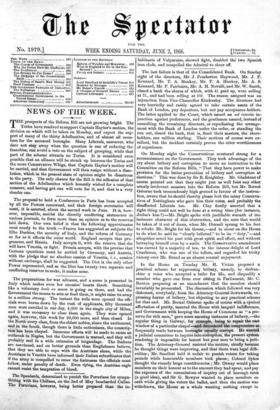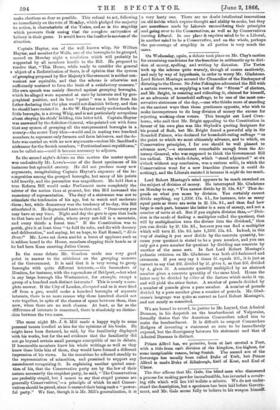In the House on Tuesday Mr. H. Vivian proposed a
practical scheme for suppressing bribery, namely, to disfran- chise a voter who accepted a bribe for life, and disqualify a member who gave one from ever sitting in Parliament, Mr. C. Buxton proposing as an amendment that the member should invariably be prosecuted. The discussion which followed was very dishonest, everybody, from the Attorney-General downwards, ex- pressing horror of bribery, but objecting to any practical scheme for that end. Mr. Bernal Osborne spoke of course with a cynical affectation of purity, taunted the House with languid indifference, and Government with keeping the House of Commons as "a pre- serve for rich men," gave some amusing instances of bribery,—the regular thing in Galway, for ea:maple, being to repair the east window of a particular chapel --mit dtmotumed the compromises se frequently made between boroughs equally corrupt. He wanted a judicial committee to inquire into corruption, the present system rendering it impossible for honest but poor men to bring a peti- tion. The Attorney-General resisted the motion, chiefly because he thought things were improving, and that there were legal diffi- culties; Mr. Smollett held it unfair to punish voters for taking pounds while honourable members took places ; Colonel Sykes thought the remedy large constituencies ; Mr. Otway would place members on their honour as to the amount they had spent, and pay the expenses of the commissions of inquiry out of borough rates (a good idea), and Sir G. Bowyer wanted to place members on oath while giving the voters the ballot, and then the motion was withdrawn, the House as a whole wanting nothing except to make elections as dear as possible. This refusal to act, following so immediately on the vote of Moeilay, which pledged the majority to action, is characteristic of the Tosses, and so is the stupidity which prevents their seeing that the complete extirpation of bribery is their game it would Jeave the landlords mastersof the situation.































 Previous page
Previous page